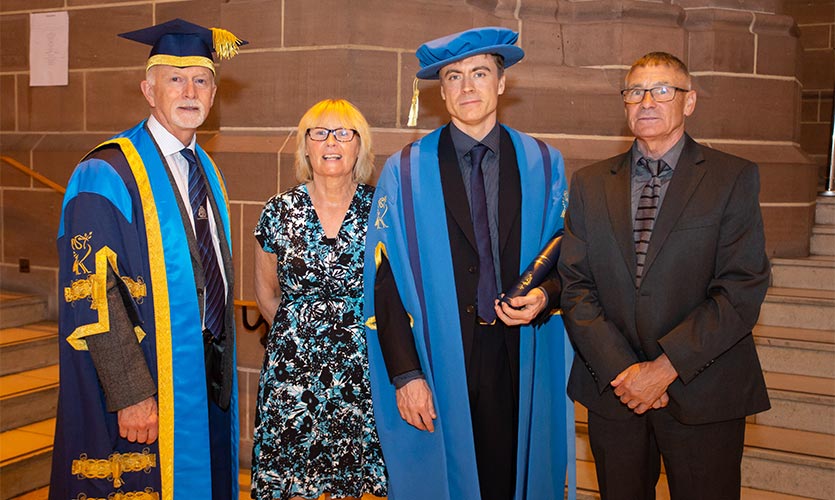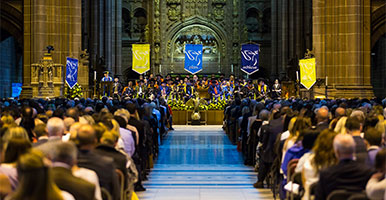Paul Lewis CBE
Presented by Mike McCartney

Honourable Pro-Chancellor, I have pleasure in presenting Paul Lewis CBE for an Honorary Fellowship in recognition of outstanding achievement in music.
Paul Lewis is internationally regarded as one of the leading classical pianists of his generation. His cycles of core piano works by Beethoven and Schubert have received unanimous critical and public acclaim worldwide, consolidating his reputation as one of the world’s foremost interpreters of the central European classical repertoire.
But Paul was not born into music – at least not classical music. There are some who seem fated to become musicians, taken to concerts and taught the value of practice and self-discipline before their feet could barely touch the pedals. But that was not Paul Lewis’ experience growing up in Huyton, Liverpool.
His father worked at the Liverpool Docks and his mother was a local council worker. There were no musicians in his family. Apart from his Dad’s collection of John Denver records there wasn’t really any music at home at all. When he was four, an aunt gave Paul a toy organ, just an octave and a half, and he’d write and play his own tunes. His interest in music, however, really started to blossom at the local Knowsley public library where he would spend hours picking out the piano records. Both parents were supportive as Paul’s interest in classical music grew – but what were the chances of a Liverpool docker's son from an unmusical family becoming the finest British pianist for generations?
In time his self-taught ability on the piano was noticed and at 14 he enrolled at the Chetham’s School in Manchester. At 18 he moved to London to study at the Guildhall School in London from where he launched his successful career and eventually came under the tutelage of the legendary Alfred Brendel.
Like Brendel, Paul Lewis isn’t a musician who flits from composer to composer and concert to concert - he really commits to exploring and getting under the skins of specific composers over a long period of time. First, he performed and recorded all the Beethoven sonatas; then Schubert’s solo piano music; and is now concentrating on Haydn’s piano sonatas. This is adding up to a body of work that is re-interpreting the classical era for the pianoforte in our time.
Paul Lewis performs regularly as soloist with the world’s great orchestras and is a frequent guest at the most prestigious international festivals, including the BBC Proms where in 2010 he became the first pianist to perform a complete Beethoven piano concerto cycle in one season. He also regularly performs back here with the Royal Liverpool Philharmonic Orchestra, where he has been an artist in residence, and has toured with the orchestra in Europe. Michael Eakin, the Chief Executive of the Philharmonic, comments: “He is always a popular performer here, and there is a real sense of the audience celebrating him as a world class artist, but also as one of their own, coming home.”
Paul is joint Artistic Director of Midsummer Music with his wife, the accomplished cellist Bjorg Lewis, which they founded near to their home in Buckinghamshire. As Artistic Directors, Paul and Bjorg have always had a very clear vision for the structure of the festival. There are no ‘star’ recitals and the same prices to listen to all of the artists who perform, an approach that creates a collegial atmostphere and a bringing together of great talent.
In 2016 he was appointed to succeed Fanny Waterman as the joint director (with Adam Gatehouse) of the Leeds Piano Competition despite claiming to “have never liked competitions.” Staying true to his unconventional musical roots, Paul has brought a new approach to the Leeds competition – opening up the repertoire, staging earlier stages of the competition around the world, and bringing a transparency to the judging process. He is also as focused on mentoring the winners as he is on finding them, ensuring that the winners are supported avoid some of the bear traps associated with winning competitions.
Paul should know – as he’s won a few over the years.
Paul’s numerous awards have included the Royal Philharmonic Society’s Instrumentalist of the Year, two Edison awards, three Gramophone awards, and the South Bank Show Classical Music award. Paul was appointed a Commander of the Order of the British Empire in the 2016 Birthday Honours for services to music.
Throughout his career, however, Paul’s local sense of humour has never left him – when asked recently by a journalist which new instrument he would learn if he found himself with six months free to give it a go, he replied: “the Highland Bagpipes. I fantasise about walking back on stage at the end of a recital and delivering an encore nobody was expecting!”
Well Paul, on whatever instrument you choose – but preferably on the piano – we look forward to hearing many more encores from you at the Phil in the coming years.
Honourable Pro-Chancellor, it is with great pleasure that I present this distinguished classical musician, a son of Liverpool, for the award of our highest honour, an Honorary Fellowship from Liverpool John Moores University.



